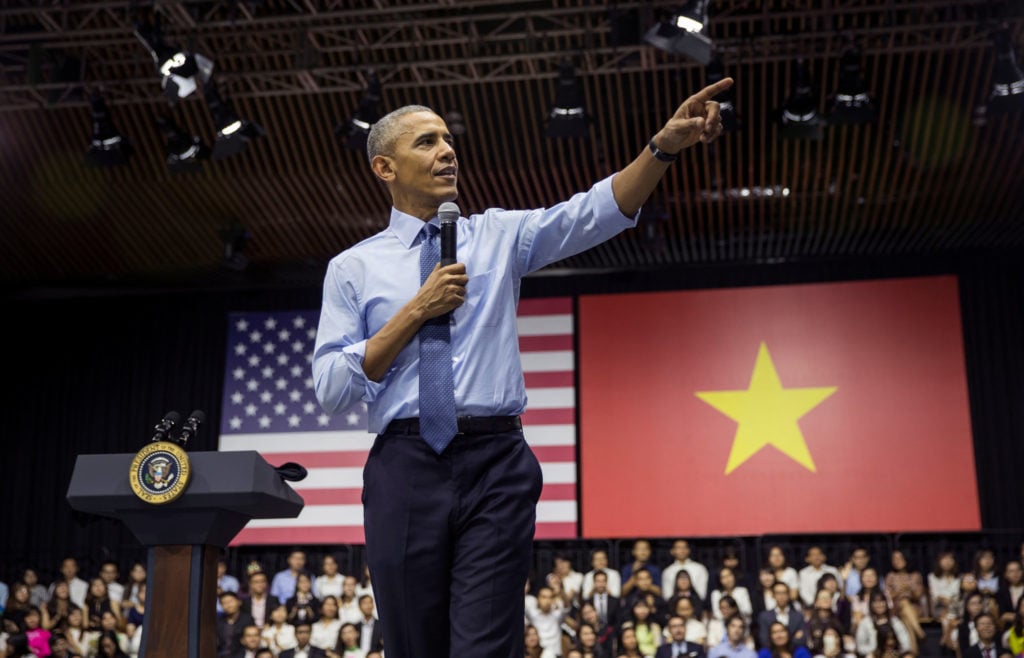
President Obama holding a town-hall-style meeting in Ho Chi Minh City, Vietnam, on Wednesday. (Credit Doug Mills/The New York Times)
The recent U.S. decision to fully lift its arms embargo against Vietnam is a victory for both countries as they seek to balance China in the region. However, the U.S. must also realize that the decision will be measured against already-strong Russian-Vietnamese strategic and defense ties. Therefore, the embargo decision is a maneuver to not only counter Chinese influence in the area, but Russian power as well.
Embargo Lift Strengthens Re-Balance
As the U.S. continues its “re-balancing” efforts to counter China in Asia, it has strengthened military ties with allies in the region, most notably Japan and the Philippines. However, the U.S. has also realized that in order to maximize its impact, it needs to reach beyond formal treaty allies. Even though some of these states may not have had the best relations with the U.S. in the past, they now realize that increased U.S. ties are in their own long-term self-interest if they desire to balance China as well.
India is currently being wooed by the U.S.—Defense Secretary Ashton Carter’s recently visited the country to shore up defense ties. Vietnam also falls in the camp of non-allied states currently being courted by the U.S. Unlike with India, the legacy of the Vietnam War still runs deep in many quarters within Washington. However, despite past and current concerns with respect to Vietnam’s human rights policies, it would seem that realism based on mutual interests eventually prevailed and resulted in the decision to lift the embargo.
Even more crucially, the U.S. must realize that it is not the only one of several regional powers vying for Vietnam’s affections. Japan and India have both increased their own outreach efforts to Vietnam in order to balance Chinese influence. They have done this both from a military perspective as well as an economic one, as Vietnam has several blocks of offshore oil in need of investment and development. The U.S., at this point, finds no fault in these efforts as they complement its own “re-balance”.
Russian Rivalry and Economic Factors
Russia, however, may prove to be a formidable obstacle to the U.S.’ charm offensive. Because of the Soviet Union’s support of North Vietnam during the Vietnam War, Russian-Vietnamese strategic ties are still quite abundant. Vietnam also plays a role in Russia’s “Asian pivot” as it seeks to both reduce its dependence on Western economic ties post-Ukraine and to simultaneously balance China itself, its erstwhile strategic partner, in Asia. Strong ties to Vietnam serve to actually put teeth behind Russian rhetoric of diversifying its Asian strategic portfolio beyond China.
Even though these strong ties have led to many past Vietnamese purchases of Russian armaments such as ships and aircraft, all parties must realize that Vietnam is not going to be exclusively in any one’s camp, save its own, for the foreseeable future. Vietnam, similar to India, realizes that the best way to maintain strategic autonomy is to pursue a truly multi-vectored foreign policy strategy.
If strengthened ties with the U.S. improves its own position based on its own interests, those ties will indeed be pursued. The same is true with respect to Russia, India, and Japan. Simply put, all of these powers must realize that they will always be only suitors and any feelings of actually consummating something more substantial will remain exactly that, a feeling.
The real front on which both the U.S. and Russia must compete for Vietnamese attention, however, is the economic one. This stems from the realization that it is China’s economic power, symbolized by its leading trading partner status with most southeast Asian states, which serves as the foundation for its growing military and diplomatic power. Chinese South China Sea maneuvers and the formation of the Asian Infrastructure Investment Bank (AIIB) symbolize these, respectively. This realization was also behind the recent ASEAN leaders’ summit held in Sunnylands, California, the first ever hosted by the U.S.
Not to be outdone, Russia recently hosted its own ASEAN summit, held in Sochi. This summit, similar to Sunnylands, promoted increased economic and technological ties with southeast Asian states as the foundation for further strengthened political ties. The case may be made that the Russian economic presence in ASEAN, apart from Vietnam, is scant. In the past, this has been due to the relatively low importance assigned to southeast Asia within Russian foreign policy objectives due to the region’s remoteness, as well as previous ASEAN skepticism with respect to Russia’s minimal economic footprint within the region.
On the economic front, the U.S. would appear to be in the lead in the race against Russia, given Vietnam’s accession to the Trans-Pacific Partnership (TPP). However, it can ill-afford to rest on its laurels as one of the Russian proposals highlighted at Sochi was to gradually integrate ASEAN economically with the Eurasian Economic Union (EEU). Because of all these factors, the U.S. must always keep in mind that its Vietnamese courtship will inevitably go against Russian strategic machinations in Vietnam, as well as both Russian and Chinese economic endeavors in the region as a whole.